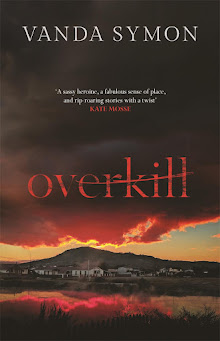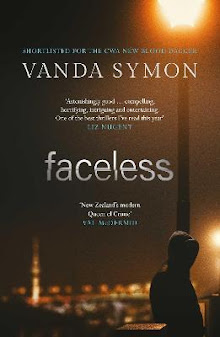The last session of the fabulous Burns Festival in Dunedin was a session on New Zealand Literature. It asked the questions What is distinctive about our literature? Who is reading it anywhere else? What responsibility does a writer have to the notion of a new Zealand Literature.
Phew, what a list of questions to pose, and what a fabulous panel of writers to pose it to: Laurence Fearnley, Catherine Chidgey, Elspeth Sandys and James Norcliffe who was interlocutor - a word we heard used with great hilarity and the occasional Canadian rounded vowels over the weekend.
Laurence Fearnley (2007) got first shot at addressing the crowd and the questions and indicated from the outset she would take a personal approach to them.
She talked of some of the moments that had shaped her literary life and captured her attention. The first she talked of was when living in Bravaria - she cited the well known image of of a stack of books burning in front of the old palace. As she didn't speak or read German she relied on the English language section of the library and where there were only four New Zealand books (Katherine Mansfield short stories, The Bone People, Once were Warriors and a screen play for the Piano, for those who were curious).
The first two lines of the Mansfield short story The Woman at the Store particularly touched her:
"All that day the heat was terrible. The wind blew close to the ground; it rooted among the tussock grass, slithered along the road, so the white pumice dust swirled in our faces, settled and sifted over us and was like a dry skin itching for growth on our bodies."
Laurence said there was something about tussocks, actually, I believe she said "I love tussock," with the fervour of the smitten.
Likewise words from Dan Davin's story First Flight gave her the chills.
These writers captured something, they captured the silence in words, which is very hard to do and what Laurence tried to achieve in her own writing, to capture the little flickering light of candles. She felt that good New Zealand fiction looked back at us from a distance and did so with a lack of sentimentality. That those writers had that skill of seeking out the bruised core, emotionally and descriptively.
Laurence found reading Australian writing a good counterpoint to New Zealand writing, and vica versa, quoting Australian poet Laurie Duggan and The Ash Range.
When talking about writing about New Zealand she quoted Rawiri Paratene; "We are all story tellers," and believed we bear witness to New Zealand and if we didn't observe it, and record it, who would. No one would do it as well as ourselves. In fact in recent months she had been thinking being a New Zealand writer was too broad, she wanted to be a South Island Writer. She felt it was important to become more focussed and concentrated and look at our home turf and a writer needed to attach themselves to a piece of land and try to fathom it.
Laurence was, as always, witty and charming and passionate.
Catherine Chidgey (2005) opened by talking about her latest NZ book purchase, a book with the dubious title Nudism, is it desirable? (1937) by Trevor Bain and used it as an illustration of how chance discoveries lead to more and the serendipity of research.
Although we had some distinctive writers, she found it difficult to answer the question waht makes New Zealand writing distinctive. The land looms large and New Zealand writing seemed to be shaped by open spaces, empty stretches, solitude and a proximity to the sea. In many ways she felt it resembled us as a young country, a spotty, stroppy, slightly ill at ease adolescent railing against authority.
But the themes we explored were shared by writers all over the world, in fact we shared far more than we liked to admit.
When talking on the question of who read us, she quoted Kate Mosse in that prizes bring us to international attention, and she was delighted when in Cork, Ireland to see a window display devoted to Lloyd Jones' Mr Pip, but when inside the only other New Zealand book she could find was The Bone People.
National awards and prizes did make a difference within New Zealand, but she feared that apart from well informed groups such as the audience here, only a handful of writers were known within our own country, which was in stark contrast to Ireland where all Irish writers were known. She longed for the day when writers here would become so embraced they would appear on Weet-Bix cards and children in play grounds would huddle around them, swapping them, I'll give you two Crumps for a Farrell, or a Baxter for a Tuwhare.
As for the question of writers having a responsibility to write about New Zealand, Catherine said no way, and that the Aussie's when asked a similar question had thought it an absurd notion. She felt it was a hallmark of an adolescent literature to expect this. She also questioned the way New Zealand writing was ghettoised in our book shops, with a section of its own when it should be mixed in to foot it with the rest of the world.
Writers needed to be able to write what they wanted, not feel obliged to write for New Zealanders or about New Zealanders. Place to heavy an obligation on writers and creativity withers.
It was a warm, humourous and compelling address.
Elspeth Sandys (1995) chose to talk off the cuff rather than have a prepared talk like the others. She felt these questions about New Zealand writing really needed to be asked of readers, not writers and that the readers would bring with them a response to the New Zealandness in your writing that you weren't even thinking about at the time.
She made observations on the writing received when she was a judge for the Katherine Mansfield short story competition about the cleanness of our writing and that we did poetry very well.
One of the greatest benefits to New Zealand writing in the last ten years, being political here, was having a Minister of the Arts who cared, and attended events, and this attention from the top filtered down to more in the way of grants. She said ten years ago within the writing community there was a jockeying for position and now there was generosity and a celebration of where we've got to.
She talked of the label of the New Zealand writer and suggested it was more regional than that. She suggested Laurence could be the great Opoho writer, and Catherine the great Hamilton writer. Countries were too vast and too varied to try and identify one type within them. Who would dare to try and identify the great British writer, for example.
Elspeth felt you couldn't talk about New Zealand Writers without talking about the market place, especially in this economic climate. The writer, persona, was now part of the business of writing as far as publishers were concerned and she felt it would be very difficult nowadays for a white middle class young male to get published, and likewise a grumpy, unkempt pensioner in a graffiti lined council flat, even if they'd written the greatest masterpiece. She quoted Gregory O'Brien on the "Art as business brigade."
James Norcliffe (2000) rounded off the session by talking of Bill Manhire's poem Zoetrope, and his encounter with a plaigerised version submitted to Takahe by a Canadian writer. He wondered what on earth the poem meant to this Canadian, when only a New Zealander, particularly an away from home one, as Bill was when he wrote this, could respond in that alarming the heart way we do when we encounter any word starting with Z.
He also talked of having work accepted for the Canadian Journal The Dalhousie Review including a poem called Hororata and getting a phone call from the editors who had conferred with all sorts of people about a possible meaning of this word with its obvious latin Horo root, but they were baffled. He took great delight in informing them it was something as prosaic as a place name.
He summed it all up nicely with the statement:
"You can take the work out of New Zealand, but you can't take the New Zealand out of the work."
Monday, October 13, 2008
Subscribe to:
Post Comments (Atom)









7 comments:
Oh Vanda,
More wonderful stuff. You have been attentive.
Now ... what is this all about?
as Bill was when he wrote this, could respond in that alarming the heart way we do when we encounter any word starting with Z.
Thanks,
Alien
I quite like the word "interlocutor." Could you post a sound file of the attendees pronouncing it?
==============
Detectives Beyond Borders
"Because Murder Is More Fun Away From Home"
http://www.detectivesbeyondborders.blogspot.com/
Excellent post. Many thanks for reviewing this session. I could never have got there to hear it in person. It was incredibly thought provoking
cheers
Melinda
Laurence Fearnley, Catherine Chidgey, Elspeth Sandys and James Norcliffe who was interlocutor - a word we heard used with great hilarity and the occasional Canadian rounded vowels over the weekend.The wind blew close to the ground; it rooted among the tussock grass, slithered along the road, so the white pumice dust swirled in our faces, settled and sifted over us and was like a dry skin itching for growth .
---------------------------
buzzmarketing
Peter, I haven't got any sound files for posting, although they did record everything.
The MC for the weekend was Barbara Larson, the publisher at Longacre Press and an expat Canadian. At the Te Torino session with the Maori writers she commented on her Canadian rounded vowels, then shortly after writer Witi Ihimaera did a perfect imitation of her 'interlocutor', much to everyone's delight!
The whole weekend could be summed up by one word - superb.
Ah, Hugh, formerly of the Emerald Isles. The Z thing. It's that aching and longing especially when away from home that makes our fevered brains seize upon and grasp it, thinking any word' starting with Z might be 'Zealand and therefore it will be preceded by a 'New' and be news from home... Pathetic, aren't we?!
ooooooooooooooo thanks Vanda.
gosh I'm bushed, must go for some zzzzzzzzzzzzzzzzzzzzzzzzzzzzzzz
zzzzzzzzzzzzzzzzzzzzzzzzzzzzzzs
Hugh
Post a Comment